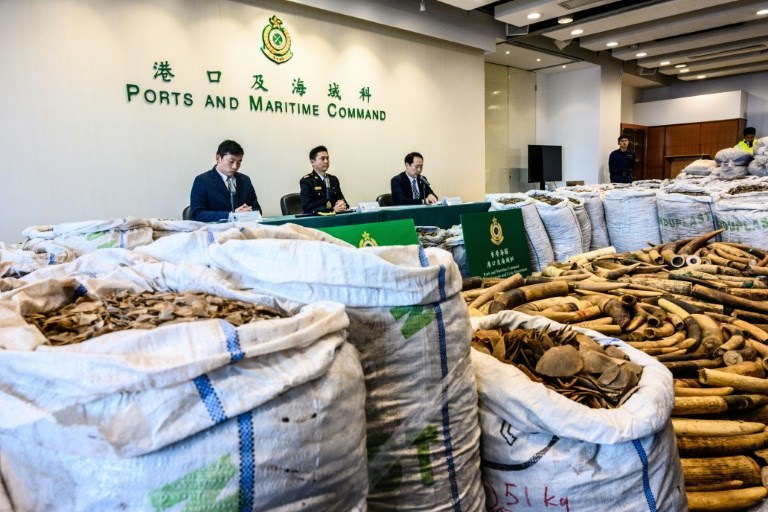A record eight tonnes of pangolin scales found in a container from Nigeria was unveiled by Hong Kong officials Friday, underscoring the city's central role in the booming illegal wildlife trade.
Customs officers said they conducted a joint investigation with mainland officials on 16 January, seizing 8,300 kilos of pangolin scales and 2,100 kilos of ivory tusks hidden inside a container -- declared to be carrying frozen beef -- at a customs facility.
"This is a record high in quantity for a seizure of pangolin scales," the customs department said in a statement.
A man and a woman from a trading company in the city have since been arrested, the department said.
Customs officers displayed dozens of sacks filled with scales to the media as well as hundreds of uncarved tusks, in an acrid-smelling room. Officials estimated the value of the haul at HK$62 million ($8 million).
The announcement came less than two weeks after a coalition of local conservation groups called on Hong Kong to do more to crack down on illegal wildlife smuggling by ending legal loopholes and lenient sentences.
In a landmark report analysing seizures and convictions, conservationists said the southern Chinese financial hub played a "disproportionate" role in wildlife crime -- accounting for around a fifth of all global ivory seizures and nearly half of all pangolins seized in the last decade.
Warning that the amount of contraband flooding through Hong Kong's ports was likely between five and 10 times the amount seized, they called on authorities to list wildlife trafficking offences under the city's organised crime legislation targeting drug traffickers and triad gangs.
Hong Kong recently increased the maximum penalties on smuggling to 10 years in jail and a HK$10 million fine.
Historically, the few who are caught have rarely faced stiff penalties.
The timid and nocturnal pangolin, which rolls into a ball when threatened -- making them defenceless against poachers -- is one of the most heavily trafficked mammals.
It is sought after for its meat and the unproven medicinal properties of their scales -- which are made from nothing more than keratin, the same material that makes up human fingernails and hair.
Pangolin populations have been ravaged by a surge in demand, particularly in mainland China.
ADM Capital Foundation, one of the groups behind last month's report, said 21 tonnes of pangolin scales have now been seized in the last year in Hong Kong.
"This is a massive increase over the previous five years and if remains unchecked, such numbers signal the likely extinction of the species," the group said.
China finally banned the ivory trade a year ago, while Hong Kong began phasing it out a few months later.
Demand, however, is still fuelled by a thriving black market.



